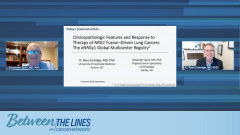
Considering the Role of NRG1 Fusions in Lung Cancer Management
Practical considerations regarding the role of NRG1 fusions in lung cancer management and how that has been informed by the eNRGy1 global registry study.
Episodes in this series

Transcript:
Alexander Spira, MD, PhD, FACP: What does this tell us about the role of NRG1 fusions in lung cancer and the effectiveness of standard treatment strategies that harbor these NRG1 fusions, if anything?
D. Ross Camidge, MD, PhD: You work with what you’ve got. Among our massive data set of 44 patients with metastatic NRG1 fusions, bearing in mind there are different fusions within there and some heterogeneity where we don’t know the fusion partners in all of them, they don’t look like they’re amazingly responsive to standard therapy. As we pointed out previously, we don’t 100% know this is a representative population, because these are the ones who found their way to academic centers. Maybe they had more indolent disease, maybe they had other features that got them to those centers. So maybe the people with more aggressive disease might have responded better to standard therapy.
Alexander Spira, MD, PhD, FACP: I think that’s fair. There are some ongoing studies with some newer agents, as well as some drugs that were tried that unfortunately did not appear to work at first glance. It would be great, now that we have these new patients in the database, to look at some of these because you’ll have access to their charts and their records. They’re probably a little bit more comprehensive in a prospective fashion as well as modern fashion. One of the things I was surprised at is that we didn’t have PD-L1 status. Of course now, if you know they have an NRG1 fusion, you’re going to know their PD-L1 status. It just shows the limitations of the data. So what questions did this paper raise and what do you think right now?
One of the things you could talk about again is the use of an RNA versus DNA assay. I think that is so important and everybody forgets it.
D. Ross Camidge, MD, PhD: If you look in this paper, 71% of the cases were found with NGS [next-generation sequencing], which was using material derived from an RNA-based extraction. You go, “That’s really weird,” an RNA-based extraction and then NGS is not that commonplace. What this is telling us is, if you’re going to find these ones, that’s the methodology that’s going to pick them up. If you’re not doing that, and if you don’t have both a DNA- and an RNA-based extraction, your chance of picking these up is probably much lower. If we use MET exon 14 skip mutation as an example of something where there’s a licensed drug, we know that an RNA-based extraction will actually double the detection rate for these rare fusions and skipping events. That’s definitely one take-home message here. The other thing, just to go back to the idea of heterogeneity, buried in the paper was the fact that these things were largely but not completely mutually exclusive with other driver oncogenes. There were a couple of cases where there was a KRAS mutation. There was at least 1 case where there was an ALK gene rearrangement. Is this just noise in the system? Is this people who are unlucky and have 2, or are there some situations where 1 driver oncogene fails to launch and something else has to take over? You can have a fusion event, then it all goes poof and nothing happens. Those are the questions that that raised with me.
Alexander Spira, MD, PhD, FACP: I wouldn’t even know what to do when you have those 2 oncogenes in the same tumor specimen. As you know, academic places, we and many others do a good job of ordering an NGS panel. As you know, this is not uniform right now. I think one of my most important take-home messages is to at least order something. If you look at the databases, and we’re part of a community group as you know, and only about 40% to 50% of patients even had 2 or 3 biomarkers checked as recently as a year ago. I think my take-home message is just a reminder, please do NGS. Any NGS is better than nothing, and certainly if you can pick 1, and there are commercial-based laboratories right now that do RNA-based testing. That I think is the ideal way to go.
D. Ross Camidge, MD, PhD: I have to give a lecture to a country that shall not be named but is in the third world, and I have to talk to them about ALK inhibitors. They don’t do any ALK testing in the entire country, and the reason is simple. They didn’t have any licensed drugs until this year. That is not the excuse in the United States. We are awash with targeted therapies. So to not do molecular testing on a patient with lung cancer, you are doing your patient a disservice.
Alexander Spira, MD, PhD, FACP: Yes. You have all these great targeted therapies, but you can’t put them on a targeted therapy if you don’t test for them. With all these things, this is just a reminder how important this is.
Transcript edited for clarity.
Newsletter
Stay up to date on recent advances in the multidisciplinary approach to cancer.









































